Analyzing EU Integration Policies Facing Globalization Challenges
VerifiedAdded on 2023/06/13
|6
|1667
|296
Essay
AI Summary
This essay examines the theories of integration and policies of the European Union in the face of globalization challenges. It discusses how international trade theories, particularly the principle of comparative advantage, have influenced the EU's economic integration. The analysis highlights that despite the benefits of globalization, such as increased competition and access to larger markets, the EU has struggled to fully capitalize on these opportunities due to internal competition and a lack of integrated economic policies. The essay argues that the EU's member states often act as separate entities, hindering the development of a competitive Europe and preventing the full realization of economies of scale. It concludes that the EU's protectionist policies and the individual economic strategies of its member states impede its ability to effectively address the challenges of globalization.
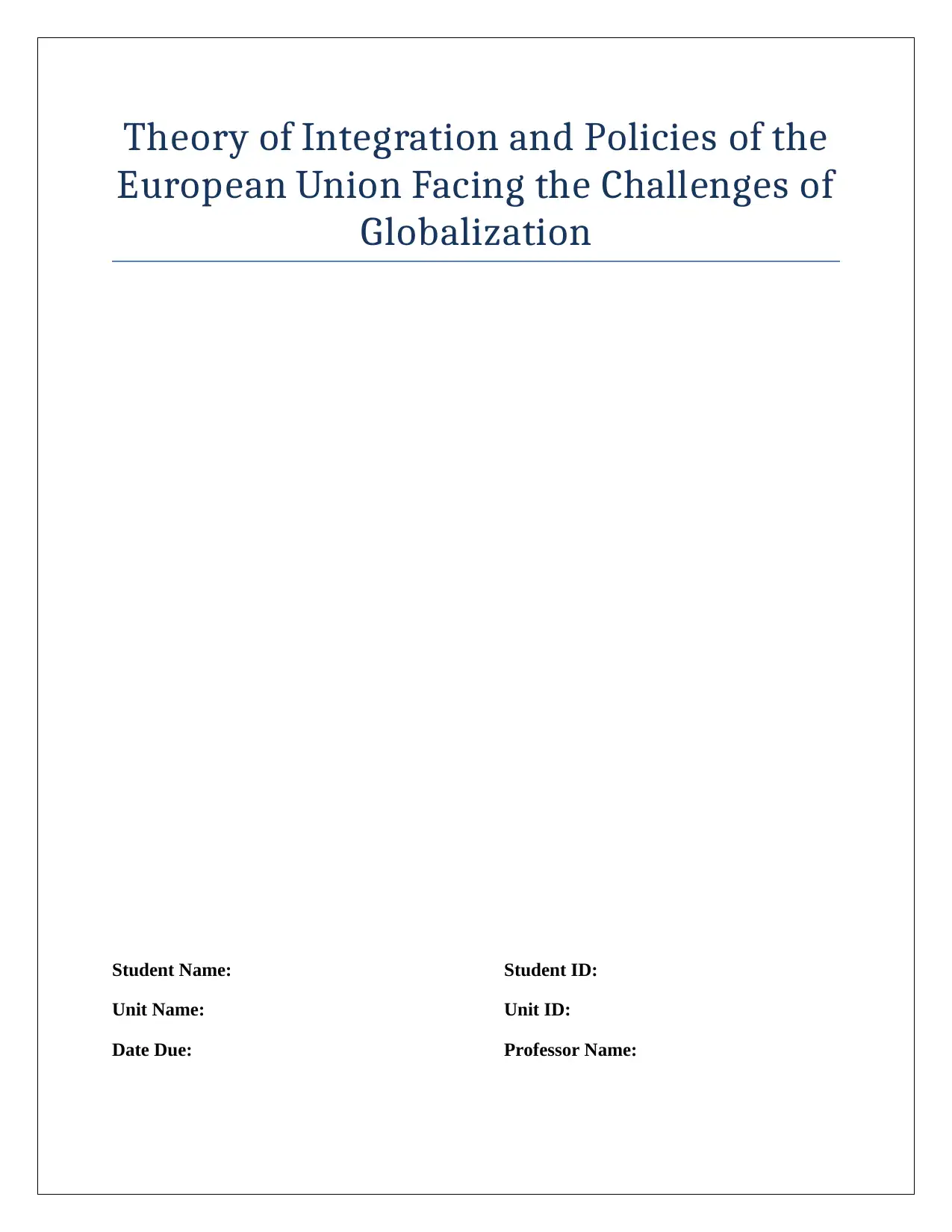
Theory of Integration and Policies of the
European Union Facing the Challenges of
Globalization
Student Name: Student ID:
Unit Name: Unit ID:
Date Due: Professor Name:
European Union Facing the Challenges of
Globalization
Student Name: Student ID:
Unit Name: Unit ID:
Date Due: Professor Name:
Paraphrase This Document
Need a fresh take? Get an instant paraphrase of this document with our AI Paraphraser
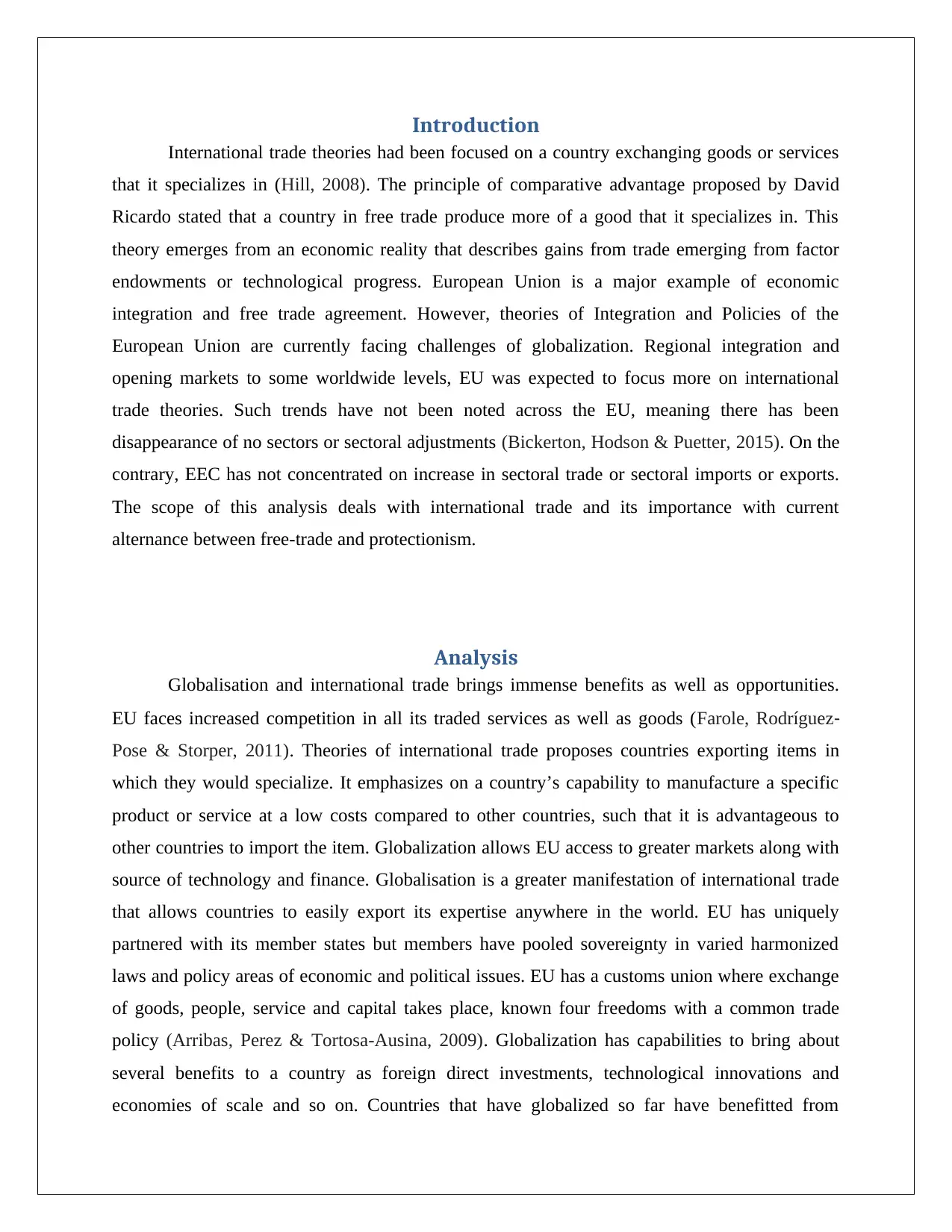
Introduction
International trade theories had been focused on a country exchanging goods or services
that it specializes in (Hill, 2008). The principle of comparative advantage proposed by David
Ricardo stated that a country in free trade produce more of a good that it specializes in. This
theory emerges from an economic reality that describes gains from trade emerging from factor
endowments or technological progress. European Union is a major example of economic
integration and free trade agreement. However, theories of Integration and Policies of the
European Union are currently facing challenges of globalization. Regional integration and
opening markets to some worldwide levels, EU was expected to focus more on international
trade theories. Such trends have not been noted across the EU, meaning there has been
disappearance of no sectors or sectoral adjustments (Bickerton, Hodson & Puetter, 2015). On the
contrary, EEC has not concentrated on increase in sectoral trade or sectoral imports or exports.
The scope of this analysis deals with international trade and its importance with current
alternance between free-trade and protectionism.
Analysis
Globalisation and international trade brings immense benefits as well as opportunities.
EU faces increased competition in all its traded services as well as goods (Farole, Rodríguez‐
Pose & Storper, 2011). Theories of international trade proposes countries exporting items in
which they would specialize. It emphasizes on a country’s capability to manufacture a specific
product or service at a low costs compared to other countries, such that it is advantageous to
other countries to import the item. Globalization allows EU access to greater markets along with
source of technology and finance. Globalisation is a greater manifestation of international trade
that allows countries to easily export its expertise anywhere in the world. EU has uniquely
partnered with its member states but members have pooled sovereignty in varied harmonized
laws and policy areas of economic and political issues. EU has a customs union where exchange
of goods, people, service and capital takes place, known four freedoms with a common trade
policy (Arribas, Perez & Tortosa-Ausina, 2009). Globalization has capabilities to bring about
several benefits to a country as foreign direct investments, technological innovations and
economies of scale and so on. Countries that have globalized so far have benefitted from
International trade theories had been focused on a country exchanging goods or services
that it specializes in (Hill, 2008). The principle of comparative advantage proposed by David
Ricardo stated that a country in free trade produce more of a good that it specializes in. This
theory emerges from an economic reality that describes gains from trade emerging from factor
endowments or technological progress. European Union is a major example of economic
integration and free trade agreement. However, theories of Integration and Policies of the
European Union are currently facing challenges of globalization. Regional integration and
opening markets to some worldwide levels, EU was expected to focus more on international
trade theories. Such trends have not been noted across the EU, meaning there has been
disappearance of no sectors or sectoral adjustments (Bickerton, Hodson & Puetter, 2015). On the
contrary, EEC has not concentrated on increase in sectoral trade or sectoral imports or exports.
The scope of this analysis deals with international trade and its importance with current
alternance between free-trade and protectionism.
Analysis
Globalisation and international trade brings immense benefits as well as opportunities.
EU faces increased competition in all its traded services as well as goods (Farole, Rodríguez‐
Pose & Storper, 2011). Theories of international trade proposes countries exporting items in
which they would specialize. It emphasizes on a country’s capability to manufacture a specific
product or service at a low costs compared to other countries, such that it is advantageous to
other countries to import the item. Globalization allows EU access to greater markets along with
source of technology and finance. Globalisation is a greater manifestation of international trade
that allows countries to easily export its expertise anywhere in the world. EU has uniquely
partnered with its member states but members have pooled sovereignty in varied harmonized
laws and policy areas of economic and political issues. EU has a customs union where exchange
of goods, people, service and capital takes place, known four freedoms with a common trade
policy (Arribas, Perez & Tortosa-Ausina, 2009). Globalization has capabilities to bring about
several benefits to a country as foreign direct investments, technological innovations and
economies of scale and so on. Countries that have globalized so far have benefitted from
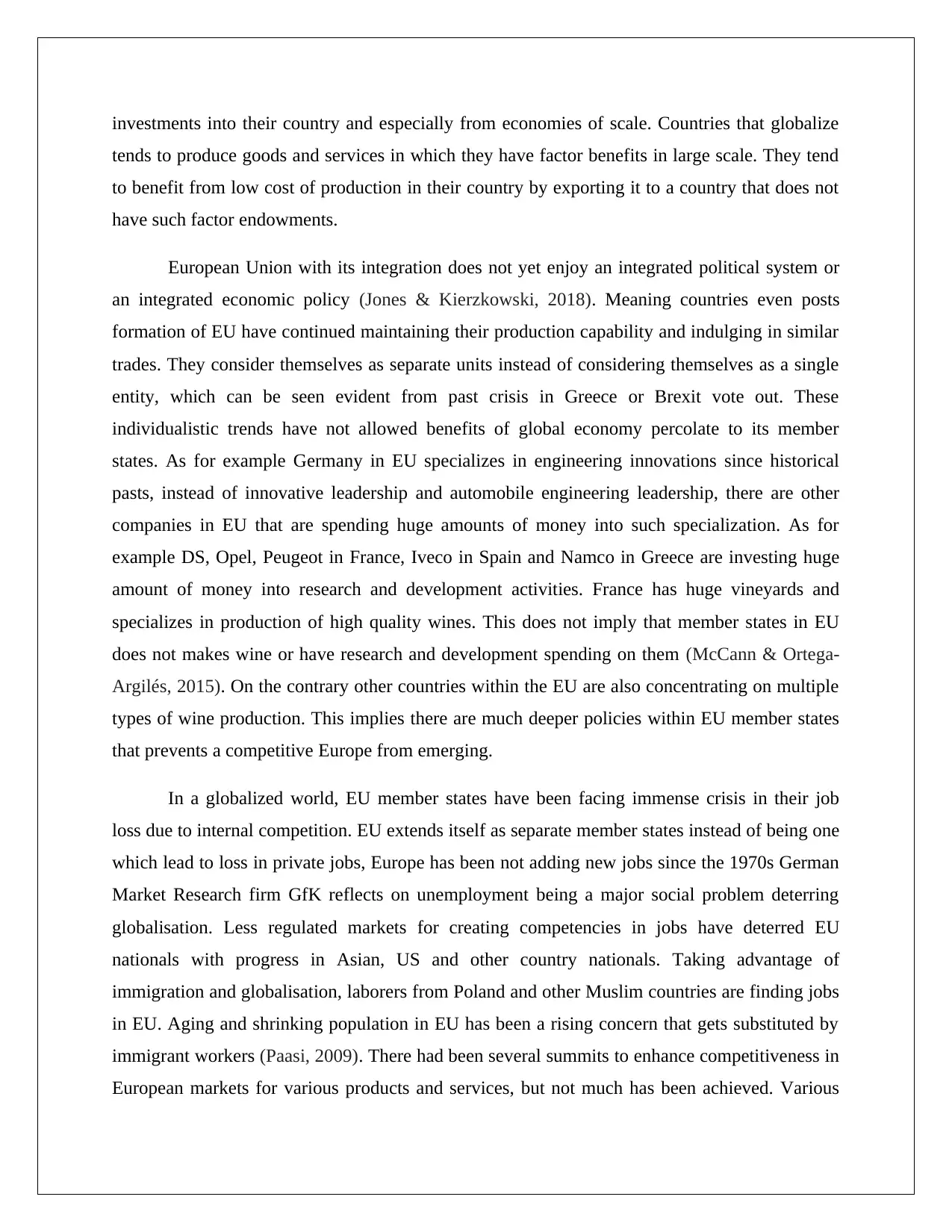
investments into their country and especially from economies of scale. Countries that globalize
tends to produce goods and services in which they have factor benefits in large scale. They tend
to benefit from low cost of production in their country by exporting it to a country that does not
have such factor endowments.
European Union with its integration does not yet enjoy an integrated political system or
an integrated economic policy (Jones & Kierzkowski, 2018). Meaning countries even posts
formation of EU have continued maintaining their production capability and indulging in similar
trades. They consider themselves as separate units instead of considering themselves as a single
entity, which can be seen evident from past crisis in Greece or Brexit vote out. These
individualistic trends have not allowed benefits of global economy percolate to its member
states. As for example Germany in EU specializes in engineering innovations since historical
pasts, instead of innovative leadership and automobile engineering leadership, there are other
companies in EU that are spending huge amounts of money into such specialization. As for
example DS, Opel, Peugeot in France, Iveco in Spain and Namco in Greece are investing huge
amount of money into research and development activities. France has huge vineyards and
specializes in production of high quality wines. This does not imply that member states in EU
does not makes wine or have research and development spending on them (McCann & Ortega-
Argilés, 2015). On the contrary other countries within the EU are also concentrating on multiple
types of wine production. This implies there are much deeper policies within EU member states
that prevents a competitive Europe from emerging.
In a globalized world, EU member states have been facing immense crisis in their job
loss due to internal competition. EU extends itself as separate member states instead of being one
which lead to loss in private jobs, Europe has been not adding new jobs since the 1970s German
Market Research firm GfK reflects on unemployment being a major social problem deterring
globalisation. Less regulated markets for creating competencies in jobs have deterred EU
nationals with progress in Asian, US and other country nationals. Taking advantage of
immigration and globalisation, laborers from Poland and other Muslim countries are finding jobs
in EU. Aging and shrinking population in EU has been a rising concern that gets substituted by
immigrant workers (Paasi, 2009). There had been several summits to enhance competitiveness in
European markets for various products and services, but not much has been achieved. Various
tends to produce goods and services in which they have factor benefits in large scale. They tend
to benefit from low cost of production in their country by exporting it to a country that does not
have such factor endowments.
European Union with its integration does not yet enjoy an integrated political system or
an integrated economic policy (Jones & Kierzkowski, 2018). Meaning countries even posts
formation of EU have continued maintaining their production capability and indulging in similar
trades. They consider themselves as separate units instead of considering themselves as a single
entity, which can be seen evident from past crisis in Greece or Brexit vote out. These
individualistic trends have not allowed benefits of global economy percolate to its member
states. As for example Germany in EU specializes in engineering innovations since historical
pasts, instead of innovative leadership and automobile engineering leadership, there are other
companies in EU that are spending huge amounts of money into such specialization. As for
example DS, Opel, Peugeot in France, Iveco in Spain and Namco in Greece are investing huge
amount of money into research and development activities. France has huge vineyards and
specializes in production of high quality wines. This does not imply that member states in EU
does not makes wine or have research and development spending on them (McCann & Ortega-
Argilés, 2015). On the contrary other countries within the EU are also concentrating on multiple
types of wine production. This implies there are much deeper policies within EU member states
that prevents a competitive Europe from emerging.
In a globalized world, EU member states have been facing immense crisis in their job
loss due to internal competition. EU extends itself as separate member states instead of being one
which lead to loss in private jobs, Europe has been not adding new jobs since the 1970s German
Market Research firm GfK reflects on unemployment being a major social problem deterring
globalisation. Less regulated markets for creating competencies in jobs have deterred EU
nationals with progress in Asian, US and other country nationals. Taking advantage of
immigration and globalisation, laborers from Poland and other Muslim countries are finding jobs
in EU. Aging and shrinking population in EU has been a rising concern that gets substituted by
immigrant workers (Paasi, 2009). There had been several summits to enhance competitiveness in
European markets for various products and services, but not much has been achieved. Various
⊘ This is a preview!⊘
Do you want full access?
Subscribe today to unlock all pages.

Trusted by 1+ million students worldwide
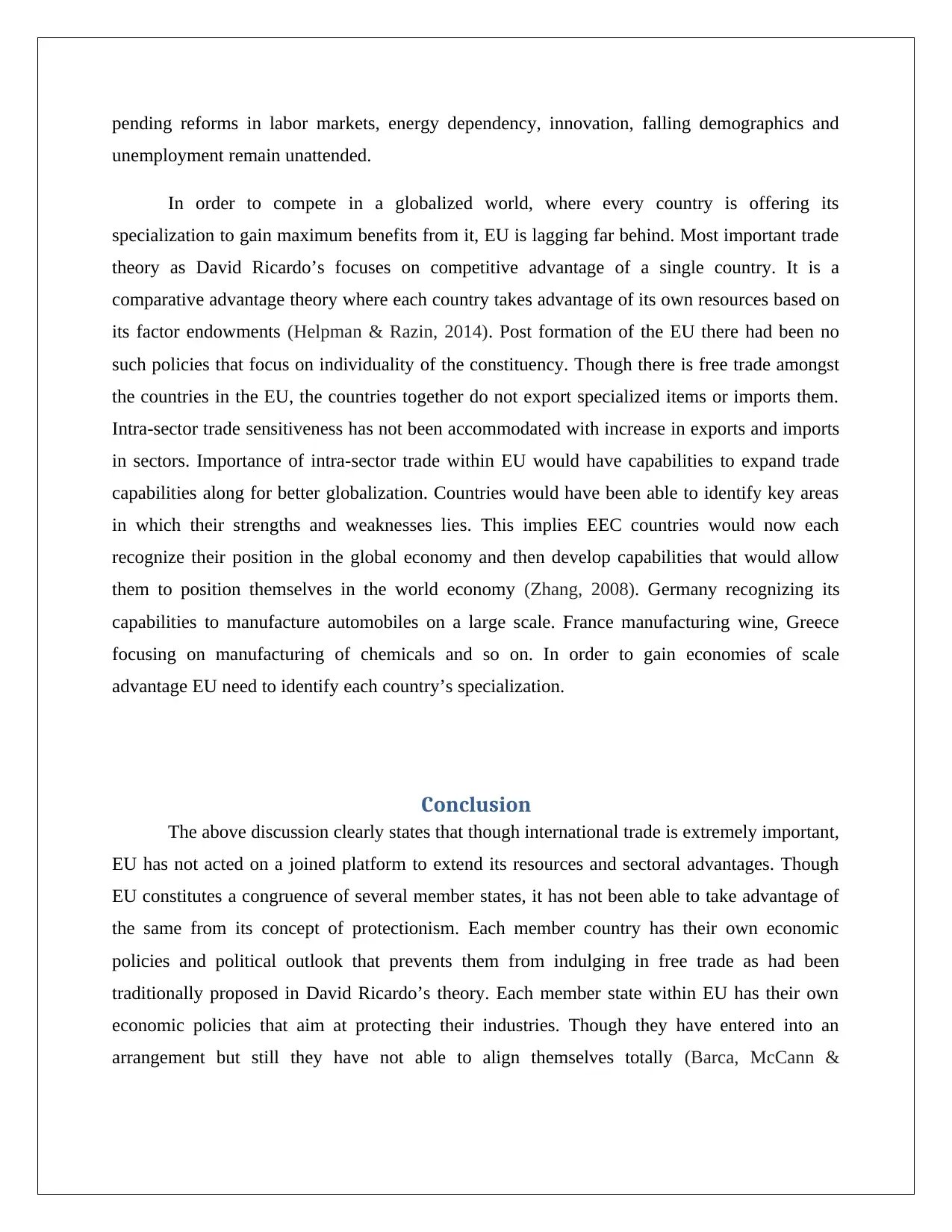
pending reforms in labor markets, energy dependency, innovation, falling demographics and
unemployment remain unattended.
In order to compete in a globalized world, where every country is offering its
specialization to gain maximum benefits from it, EU is lagging far behind. Most important trade
theory as David Ricardo’s focuses on competitive advantage of a single country. It is a
comparative advantage theory where each country takes advantage of its own resources based on
its factor endowments (Helpman & Razin, 2014). Post formation of the EU there had been no
such policies that focus on individuality of the constituency. Though there is free trade amongst
the countries in the EU, the countries together do not export specialized items or imports them.
Intra-sector trade sensitiveness has not been accommodated with increase in exports and imports
in sectors. Importance of intra-sector trade within EU would have capabilities to expand trade
capabilities along for better globalization. Countries would have been able to identify key areas
in which their strengths and weaknesses lies. This implies EEC countries would now each
recognize their position in the global economy and then develop capabilities that would allow
them to position themselves in the world economy (Zhang, 2008). Germany recognizing its
capabilities to manufacture automobiles on a large scale. France manufacturing wine, Greece
focusing on manufacturing of chemicals and so on. In order to gain economies of scale
advantage EU need to identify each country’s specialization.
Conclusion
The above discussion clearly states that though international trade is extremely important,
EU has not acted on a joined platform to extend its resources and sectoral advantages. Though
EU constitutes a congruence of several member states, it has not been able to take advantage of
the same from its concept of protectionism. Each member country has their own economic
policies and political outlook that prevents them from indulging in free trade as had been
traditionally proposed in David Ricardo’s theory. Each member state within EU has their own
economic policies that aim at protecting their industries. Though they have entered into an
arrangement but still they have not able to align themselves totally (Barca, McCann &
unemployment remain unattended.
In order to compete in a globalized world, where every country is offering its
specialization to gain maximum benefits from it, EU is lagging far behind. Most important trade
theory as David Ricardo’s focuses on competitive advantage of a single country. It is a
comparative advantage theory where each country takes advantage of its own resources based on
its factor endowments (Helpman & Razin, 2014). Post formation of the EU there had been no
such policies that focus on individuality of the constituency. Though there is free trade amongst
the countries in the EU, the countries together do not export specialized items or imports them.
Intra-sector trade sensitiveness has not been accommodated with increase in exports and imports
in sectors. Importance of intra-sector trade within EU would have capabilities to expand trade
capabilities along for better globalization. Countries would have been able to identify key areas
in which their strengths and weaknesses lies. This implies EEC countries would now each
recognize their position in the global economy and then develop capabilities that would allow
them to position themselves in the world economy (Zhang, 2008). Germany recognizing its
capabilities to manufacture automobiles on a large scale. France manufacturing wine, Greece
focusing on manufacturing of chemicals and so on. In order to gain economies of scale
advantage EU need to identify each country’s specialization.
Conclusion
The above discussion clearly states that though international trade is extremely important,
EU has not acted on a joined platform to extend its resources and sectoral advantages. Though
EU constitutes a congruence of several member states, it has not been able to take advantage of
the same from its concept of protectionism. Each member country has their own economic
policies and political outlook that prevents them from indulging in free trade as had been
traditionally proposed in David Ricardo’s theory. Each member state within EU has their own
economic policies that aim at protecting their industries. Though they have entered into an
arrangement but still they have not able to align themselves totally (Barca, McCann &
Paraphrase This Document
Need a fresh take? Get an instant paraphrase of this document with our AI Paraphraser
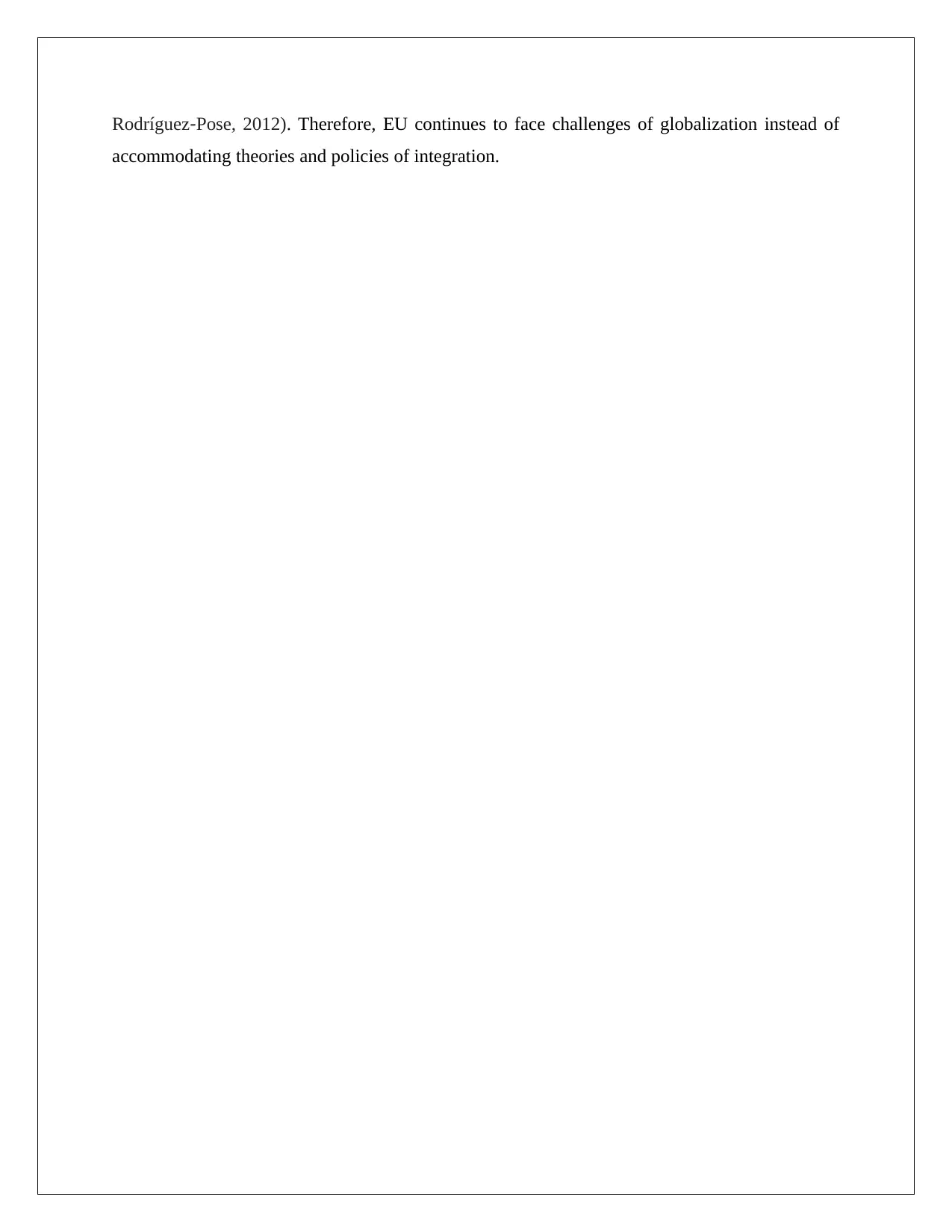
Rodríguez‐Pose, 2012). Therefore, EU continues to face challenges of globalization instead of
accommodating theories and policies of integration.
accommodating theories and policies of integration.
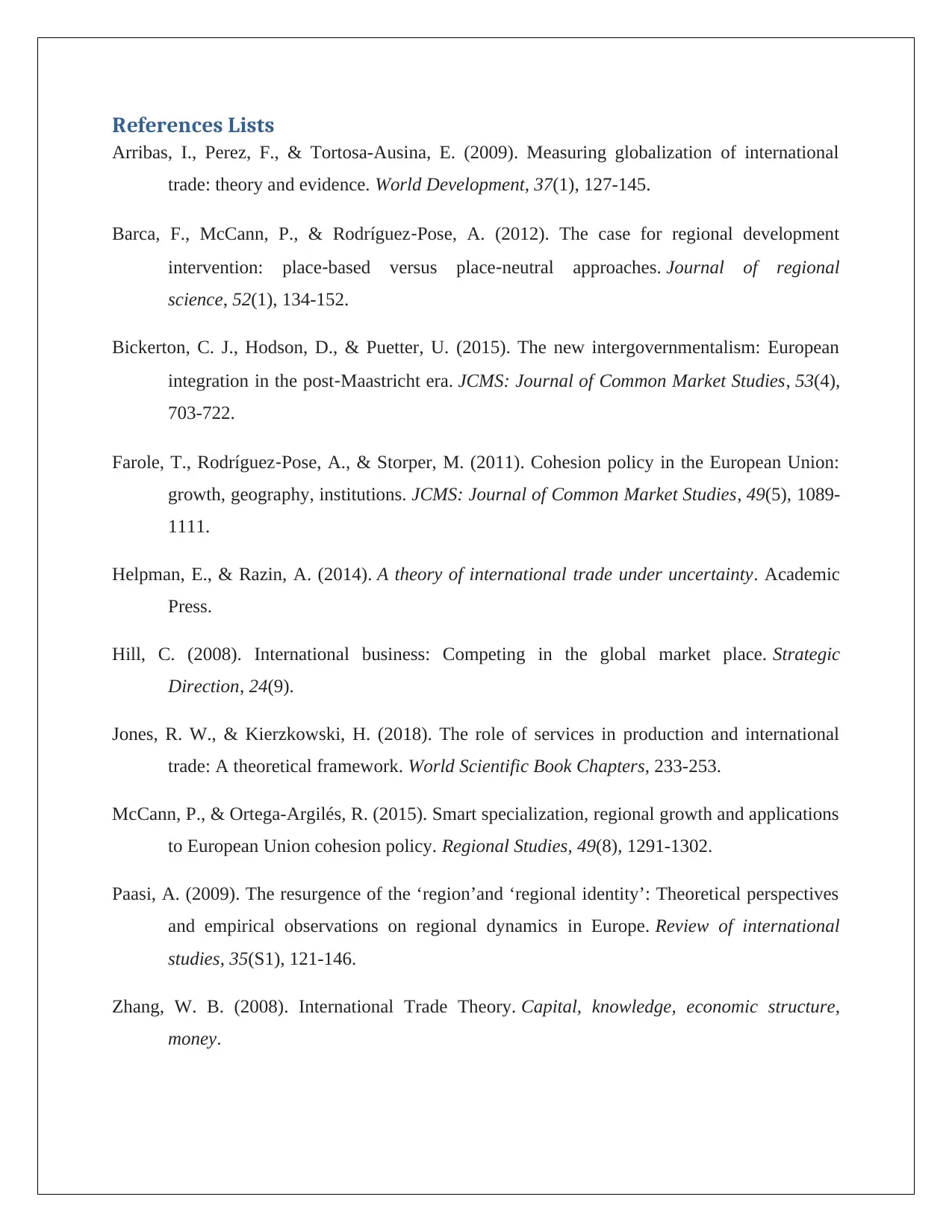
References Lists
Arribas, I., Perez, F., & Tortosa-Ausina, E. (2009). Measuring globalization of international
trade: theory and evidence. World Development, 37(1), 127-145.
Barca, F., McCann, P., & Rodríguez‐Pose, A. (2012). The case for regional development
intervention: place‐based versus place‐neutral approaches. Journal of regional
science, 52(1), 134-152.
Bickerton, C. J., Hodson, D., & Puetter, U. (2015). The new intergovernmentalism: European
integration in the post‐Maastricht era. JCMS: Journal of Common Market Studies, 53(4),
703-722.
Farole, T., Rodríguez‐Pose, A., & Storper, M. (2011). Cohesion policy in the European Union:
growth, geography, institutions. JCMS: Journal of Common Market Studies, 49(5), 1089-
1111.
Helpman, E., & Razin, A. (2014). A theory of international trade under uncertainty. Academic
Press.
Hill, C. (2008). International business: Competing in the global market place. Strategic
Direction, 24(9).
Jones, R. W., & Kierzkowski, H. (2018). The role of services in production and international
trade: A theoretical framework. World Scientific Book Chapters, 233-253.
McCann, P., & Ortega-Argilés, R. (2015). Smart specialization, regional growth and applications
to European Union cohesion policy. Regional Studies, 49(8), 1291-1302.
Paasi, A. (2009). The resurgence of the ‘region’and ‘regional identity’: Theoretical perspectives
and empirical observations on regional dynamics in Europe. Review of international
studies, 35(S1), 121-146.
Zhang, W. B. (2008). International Trade Theory. Capital, knowledge, economic structure,
money.
Arribas, I., Perez, F., & Tortosa-Ausina, E. (2009). Measuring globalization of international
trade: theory and evidence. World Development, 37(1), 127-145.
Barca, F., McCann, P., & Rodríguez‐Pose, A. (2012). The case for regional development
intervention: place‐based versus place‐neutral approaches. Journal of regional
science, 52(1), 134-152.
Bickerton, C. J., Hodson, D., & Puetter, U. (2015). The new intergovernmentalism: European
integration in the post‐Maastricht era. JCMS: Journal of Common Market Studies, 53(4),
703-722.
Farole, T., Rodríguez‐Pose, A., & Storper, M. (2011). Cohesion policy in the European Union:
growth, geography, institutions. JCMS: Journal of Common Market Studies, 49(5), 1089-
1111.
Helpman, E., & Razin, A. (2014). A theory of international trade under uncertainty. Academic
Press.
Hill, C. (2008). International business: Competing in the global market place. Strategic
Direction, 24(9).
Jones, R. W., & Kierzkowski, H. (2018). The role of services in production and international
trade: A theoretical framework. World Scientific Book Chapters, 233-253.
McCann, P., & Ortega-Argilés, R. (2015). Smart specialization, regional growth and applications
to European Union cohesion policy. Regional Studies, 49(8), 1291-1302.
Paasi, A. (2009). The resurgence of the ‘region’and ‘regional identity’: Theoretical perspectives
and empirical observations on regional dynamics in Europe. Review of international
studies, 35(S1), 121-146.
Zhang, W. B. (2008). International Trade Theory. Capital, knowledge, economic structure,
money.
⊘ This is a preview!⊘
Do you want full access?
Subscribe today to unlock all pages.

Trusted by 1+ million students worldwide
1 out of 6
Related Documents
Your All-in-One AI-Powered Toolkit for Academic Success.
+13062052269
info@desklib.com
Available 24*7 on WhatsApp / Email
![[object Object]](/_next/static/media/star-bottom.7253800d.svg)
Unlock your academic potential
Copyright © 2020–2026 A2Z Services. All Rights Reserved. Developed and managed by ZUCOL.





